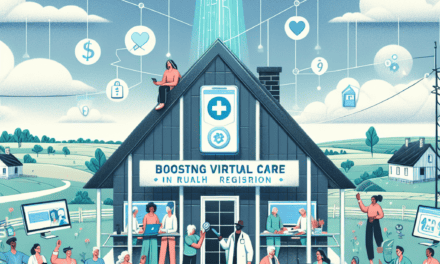Premise Health Achieves Success with Advanced Data Ingestion and Analytics Solutions

In the rapidly evolving landscape of healthcare, data has emerged as a critical asset for driving innovation, improving patient outcomes, and enhancing operational efficiency. Premise Health, a leading direct healthcare provider, has successfully harnessed the power of advanced data ingestion and analytics solutions to transform its operations and deliver superior healthcare services. This article delves into the strategies and technologies that have enabled Premise Health to achieve remarkable success in this domain.
1. The Role of Data Ingestion in Healthcare Transformation
Data ingestion is the process of collecting and importing data for immediate use or storage in a database. In the context of healthcare, it involves gathering data from various sources such as electronic health records (EHRs), wearable devices, and patient feedback systems. Premise Health has leveraged advanced data ingestion techniques to streamline its data collection processes, ensuring that accurate and up-to-date information is readily available for analysis.
One of the key challenges in healthcare data ingestion is the sheer volume and variety of data. Premise Health addresses this challenge by implementing robust data ingestion pipelines that can handle large datasets from diverse sources. These pipelines are designed to ensure data quality and integrity, which are crucial for making informed decisions.
Moreover, Premise Health employs real-time data ingestion to capture and process data as it is generated. This capability is particularly valuable in scenarios where timely interventions can significantly impact patient outcomes. For instance, real-time monitoring of vital signs through wearable devices allows healthcare providers to detect anomalies and respond promptly.
By investing in advanced data ingestion solutions, Premise Health has laid a strong foundation for its analytics initiatives. The ability to efficiently collect and process data from multiple sources enables the organization to gain a comprehensive view of patient health and operational performance.
2. Advanced Analytics: Unlocking Insights for Better Decision-Making
Once data is ingested, the next step is to analyze it to extract meaningful insights. Premise Health has embraced advanced analytics techniques to transform raw data into actionable intelligence. This involves the use of sophisticated algorithms and machine learning models to identify patterns, trends, and correlations within the data.
One of the primary applications of advanced analytics at Premise Health is predictive analytics. By analyzing historical data, the organization can forecast future trends and outcomes. For example, predictive analytics can be used to identify patients at risk of developing chronic conditions, enabling proactive interventions to prevent disease progression.
In addition to predictive analytics, Premise Health utilizes prescriptive analytics to recommend optimal courses of action. This involves evaluating various scenarios and determining the best strategies to achieve desired outcomes. For instance, prescriptive analytics can guide resource allocation decisions, ensuring that healthcare facilities are adequately staffed and equipped to meet patient needs.
Furthermore, Premise Health leverages data visualization tools to present complex data in an easily understandable format. Interactive dashboards and visual reports enable healthcare professionals to quickly grasp key insights and make informed decisions. This enhances collaboration and communication across the organization, fostering a data-driven culture.
Through its advanced analytics capabilities, Premise Health has gained a competitive edge in the healthcare industry. The ability to derive actionable insights from data empowers the organization to optimize its operations, improve patient care, and drive innovation.
3. Enhancing Patient Care with Data-Driven Insights
At the heart of Premise Health’s data strategy is the goal of enhancing patient care. By leveraging data-driven insights, the organization is able to deliver personalized and effective healthcare services that meet the unique needs of each patient.
One of the ways Premise Health achieves this is through the implementation of personalized treatment plans. By analyzing patient data, healthcare providers can tailor interventions to suit individual preferences and medical histories. This approach not only improves patient satisfaction but also enhances treatment outcomes.
Moreover, data analytics enables Premise Health to identify gaps in care and address them proactively. For example, by analyzing patient feedback and outcomes, the organization can pinpoint areas where improvements are needed and implement targeted interventions. This continuous improvement process ensures that patients receive the highest quality of care.
In addition to improving individual patient care, Premise Health uses data analytics to enhance population health management. By analyzing data at the population level, the organization can identify trends and patterns that inform public health initiatives. This includes identifying at-risk populations and implementing preventive measures to reduce the incidence of chronic diseases.
Overall, Premise Health’s data-driven approach to patient care has resulted in improved health outcomes, increased patient satisfaction, and reduced healthcare costs. By harnessing the power of data, the organization is able to deliver value-based care that prioritizes patient well-being.
4. Operational Efficiency: Streamlining Processes with Data
In addition to enhancing patient care, Premise Health has leveraged data analytics to optimize its operational processes. By analyzing data related to resource utilization, workflow efficiency, and financial performance, the organization is able to identify areas for improvement and implement strategies to enhance efficiency.
One of the key areas where data analytics has made a significant impact is in resource allocation. By analyzing data on patient demand and staff availability, Premise Health can optimize scheduling and ensure that resources are allocated where they are needed most. This not only improves operational efficiency but also enhances patient satisfaction by reducing wait times.
Furthermore, data analytics enables Premise Health to streamline its supply chain management processes. By analyzing data on inventory levels, order patterns, and supplier performance, the organization can optimize its procurement strategies and reduce waste. This results in cost savings and ensures that healthcare facilities are adequately stocked with essential supplies.
In addition to resource allocation and supply chain management, data analytics is used to enhance financial performance. By analyzing financial data, Premise Health can identify areas where costs can be reduced and revenue can be increased. This includes optimizing billing processes, reducing administrative overhead, and identifying opportunities for revenue growth.
Overall, Premise Health’s data-driven approach to operational efficiency has resulted in significant cost savings, improved resource utilization, and enhanced financial performance. By leveraging data analytics, the organization is able to streamline its operations and deliver high-quality healthcare services in a cost-effective manner.
5. Overcoming Challenges and Future Directions
While Premise Health has achieved remarkable success with its data ingestion and analytics initiatives, the journey has not been without challenges. One of the primary challenges is ensuring data privacy and security. With the increasing volume of sensitive patient data being collected and analyzed, it is crucial to implement robust security measures to protect against data breaches and unauthorized access.
To address this challenge, Premise Health has implemented comprehensive data governance policies and invested in advanced security technologies. This includes encryption, access controls, and regular security audits to ensure that patient data is protected at all times.
Another challenge is the integration of data from disparate sources. With data being collected from various systems and devices, it is essential to ensure that it is integrated seamlessly to provide a holistic view of patient health. Premise Health has addressed this challenge by implementing data integration platforms that facilitate the seamless exchange of data between different systems.
Looking to the future, Premise Health is exploring new opportunities to further enhance its data capabilities. This includes the use of artificial intelligence and machine learning to automate data analysis and generate deeper insights. Additionally, the organization is exploring the potential of blockchain technology to enhance data security and interoperability.
In conclusion, Premise Health’s success with advanced data ingestion and analytics solutions is a testament to the transformative power of data in healthcare. By leveraging data-driven insights, the organization has been able to enhance patient care, optimize operations, and drive innovation. As the healthcare industry continues to evolve, Premise Health is well-positioned to remain at the forefront of data-driven healthcare delivery.
Conclusion
Premise Health’s journey in leveraging advanced data ingestion and analytics solutions highlights the critical role of data in transforming healthcare delivery. Through strategic investments in data technologies and a commitment to data-driven decision-making, the organization has achieved significant improvements in patient care, operational efficiency, and financial performance. As the healthcare landscape continues to evolve, Premise Health’s success serves as a model for other organizations seeking to harness the power of data to drive innovation and improve outcomes. By continuing to explore new technologies and approaches, Premise Health is poised to remain a leader in the field of data-driven healthcare.





